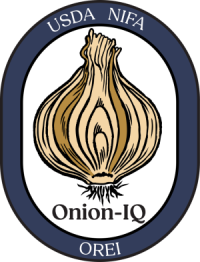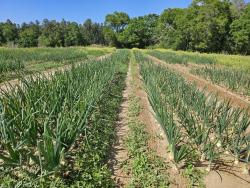About
 Organic onion production in the southern US has been significantly limited by soil-borne bacterial pathogens. Most conventional and organic management practices for control of these pathogens are either ineffective, or have not been rigorously evaluated. In the Onion-IQ project, funded by NIFA OREI, the University of Georgia and the Texas A&M University will coordinate an integrated multi-regional effort to improve the quality of organically-grown onions by managing two soil-borne bacterial diseases: sour skin and slippery skin.
Organic onion production in the southern US has been significantly limited by soil-borne bacterial pathogens. Most conventional and organic management practices for control of these pathogens are either ineffective, or have not been rigorously evaluated. In the Onion-IQ project, funded by NIFA OREI, the University of Georgia and the Texas A&M University will coordinate an integrated multi-regional effort to improve the quality of organically-grown onions by managing two soil-borne bacterial diseases: sour skin and slippery skin.
Using an integrated approach, we will optimize organic nitrogen fertilization scheduling in organic onions to increase productivity, improve food safety, and improve soil health by decreasing pathogenic bacterial populations and increasing in beneficial microflora. We will integrate bio-fumigation and soil-solarization with nitrogen fertilization strategies, conduct soil-biome assessments, and evaluate plant-parasitic and beneficial nematodes, weeds and soil-borne bacterial diseases. Economic assessments, extension and education efforts into each objective, and our publications and findings will be made available on this website.
 OBJECTIVES: Objectives: Five-broad and integrated objectives will aim at addressing critical needs for organic onion growers in the southeastern and southwestern U.S.
OBJECTIVES: Objectives: Five-broad and integrated objectives will aim at addressing critical needs for organic onion growers in the southeastern and southwestern U.S.
- Objective 1:Evaluate cultural practices that reduce soil-borne bacterial pathogens and weeds and increase/sustain growth of beneficial microflora, and predators and natural enemies.
- Objective 2:Evaluate and optimize N-fertilization programs in organic onions that will increase productivity and reduce N loss and improve food safety.
- Objective 3: Integrate activities from objectives 1 and 2 to improve soil health (decrease in sour skin and slippery skin; evaluation of soil-microbiome and predators and natural enemies) and improve food safety.
- Objective 4:Conduct economic analysis.
- Objective 5: Conduct outreach activities and provide educational opportunities.
Funding

This project was funded by the Organic Research and Extension Initiative grant, part of the USDA National Institute of Food and Agriculture. Award Number 2023-51300-40913

